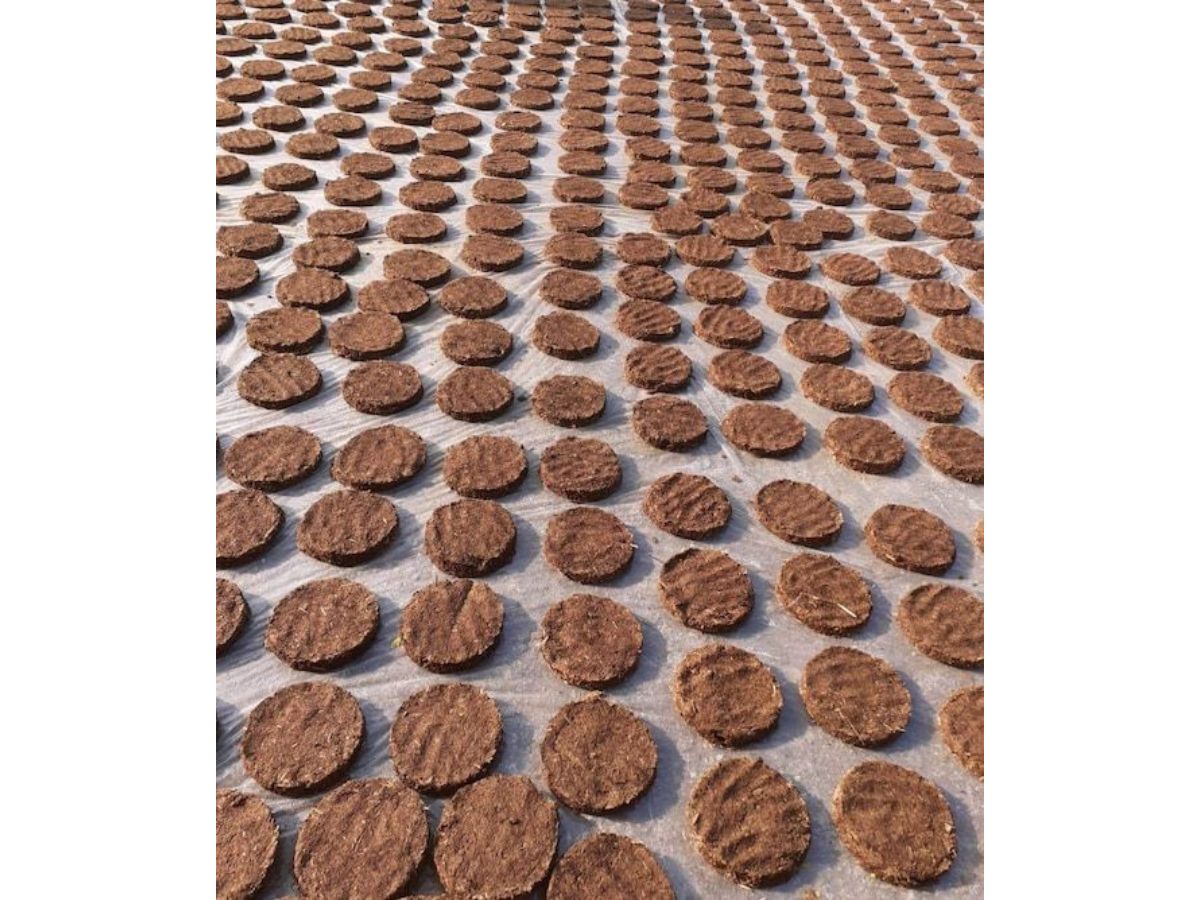How to Grow
How to use Cow Dung Cakes for plants?
Physical appearance is only a small part of what constitutes identity and value. This is one of the biggest truths in life.
You may frown upon the murky, unclean water, but it is where a lotus is born. And looking at a majestic lotus, you cannot have a clue about its birthplace, right?
Similarly, cow dung is avoided for its foul smell but is again used in various prayer rituals like havan.
In rural areas, people still use cow dung as a natural disinfectant to clean their homes.
Cow dung is considered auspicious and is put to various uses. From cleaning homes to providing nutrition to plants and vegetation, cow dung is of great value.
Cow dung cakes made from fresh cow dung are all you need for a flourishing garden. Cow dung cake is an organic fertilizer that carries essential nutrients for healthy plant growth of plants.
In this blog, we will learn about
- Benefits of using cow dung cakes
- How to make cow dung cakes?
- How to use cow dung on plants?
- Other uses of cow dung
So, are you ready to learn more about cow dung cakes? Let’s start.
Benefits of using cow dung cakes
Cow dung contains three prime nutrients that plants require and that’s the biggest benefit of using it for plant growth. Read more about the benefits of using cow dung cakes for plants below: -
- Cow dung has about 3% nitrogen content. Nitrogen is a prime component in chlorophyll, and without that, plants cannot make their food. It is also a crucial part of amino acids, which serve as the building blocks of proteins. Plants deteriorate and perish without proteins.
- One of the key plant nutrients, phosphorus, is present in cow dung at a rate of 2%. It is a component of plant cells and necessary for cell division and the growth of the plant's growing tip.
- 1% of the potassium in cow dung aids in controlling the stomata's opening and shutting, which controls the exchange of water vapor, oxygen, and carbon dioxide. Produce suffers and plant growth is impeded when there is a potassium deficiency.
- It is reasonable and cheaper to use cow dung cakes to reduce soil deterioration brought on by excessive chemical fertilizers, which can change the bacterial diversity and community structure of soils
- The soil's ability to retain moisture is increased when cow dung cakes are mixed with soil
- You don't need to water your plant as frequently because soils can hold more moisture after you feed it with cow dung cakes
- With cow dung cakes, the aeration also improves, which helps break up compacted soils.
How to make cow dung cakes?
- First of all, you have to gather all of the excrement in one location. For improved processing, you must collect the feces for several days
- The second step is mixing cow dung with water. Put on gloves and a mask for your hygiene. Avoid making it excessively thin or thick.
- The third step is to make flat cakes. A thin and flat shape is much preferred because it will dry faster and would be better for carrying purposes later.
- These cow dung cakes are dried on the walls of houses in rural India. To dry these cakes, use the side of your home that gets the most sunlight. Typically, it takes 3-5 days for everything to dry completely.
- Now put them away somewhere dry so you can use them later as fertilizer or as cooking fuel.
How to use cow dung cakes on plants?
Common method: -
- 1 cake should be soaked in 2.5 litres of water for 2 to 3 days
- The cake should be broken up and combined with water
- Feed the plant with 300 ml of the solution once every week
- Up to five litres of water can be used with a set of two cakes
- Make sure the soil has appropriate moisture before adding the solution to each pot
Fresh cow dung
Fresh cow dung should be avoided for direct application to plants because, first of all, it has a foul smell, and secondly, plants could be burned by the high concentration of salts and nitrogen present in the dung. It also includes harmful microorganisms like E. coli, that are toxic to both plants and people. Additionally, it includes weed seeds, which might result in an abundance of weeds or undesirable plants in your garden.
Aged cow dung
The more the cow dung ages, the better it gets. For that you can dig a hole in your garden and collect cow dung for several months. Cover it with your garden soil and let it age for at least 6 months. After that collect soil from here and use it as a fertilizer for your plants.
Dehydrated cow dung cakes
The one mentioned above in "how to make cow dung cakes" is dehydrated cow dung cake. Dehydration simply means a lack of water. After preparing the cake, you leave it to dry for 3–5 days, during which time the water content is absorbed and the cake is ready for use. Through this procedure, the amount of salt, ammonia, and dangerous bacteria is somewhat decreased.
Composted cow dung
The greatest and safest organic fertilizer for your plants is produced when you add cow dung to the composting process. Composting cow dung has a number of advantages, like reducing dangerous ammonia levels, eradicating weed seeds already present in the soil, and enhancing soil drainage, aeration, and moisture retention. This kind of cow dung is the safest and best choice for plants and can be put once a month on the top soil after raking or tilling the soil, or it can be mixed with potting soil in a 20 to 30% proportion.
Other uses of cow dung
Fuel and bio gas
The cow dung cakes are very good as fuel. People in rural areas manufacture their own cow dung cakes to use as fuel for cooking. Methane makes up 55% of the biogas, along with carbon dioxide (30%) and other gases including nitrogen and hydrogen. The entire collection of cow manure is used as feedstock to create biogas. It results from the anaerobic breakdown of cow dung. Cow manure may easily be converted into biogas. Certainly, using recycled cow dung expands the possibilities for creating a greener environment.
Heating purposes
In colder regions, cow dung cakes can be used in fire places that will keep the room warm.
Making paper
Do you know that the high fiber substance in cow dung cake helps produce high-quality papers? The fibers of cow dung are pressed into the paper. This is one of the lesser-known uses of cow dung cakes.
Disinfectant
In rural India and in ancient times, people used to apply cow dung to their walls and floors to keep insects and mosquitoes away. Cow dung cakes are frequently burned in Indian houses in the evening since they are disinfectants.
Purifies air
You must have seen cow dung cakes burned in almost all Indian festive rituals. The smoke coming from burning cow dung cakes is not only a disinfectant but also purifies the air. It is an anti-pollutant and possesses anti-radiation properties.
Frequently Asked Questions related to Cow Dung Cakes
Can we use cow dung directly for plants?
No, you cannot use fresh cow dung directly on plants, especially in a growing garden. The cause is because too many nutrients, including ammonia, are present in cow dung and could burn the plants. Before being utilized, this cow dung must first be composted.
How do you apply cow dung to plants?
After combining cow dung in a 20 to 30 percent ratio with potting soil, it can be used. After raking or tilling the soil, it can also be applied once a month to the top soil.
Is cow dung good for potted plants?
Yes, cow dung is good for the growth of potted plants. But keep in mind that before applying cow dung on potted plants, it must first be composted. Cow dung that has been composted has minerals, organic matter, and healthy organisms that are helpful for potted plants.
What are the disadvantages of cow dung?
The biggest disadvantage of cow dung is collecting and processing. In addition, cow dung is a heavy material with little nutritional value. In order to see positive effects, at least 10 to 20 tonnes per hectare must be used. Cow manure also releases methane, a greenhouse gas..
How do you mix cow dung with soil?
To achieve the desired results, combine one part cow dung and three parts soil.
Why fresh cow dung should not be used for plants?
Fresh cow dung should not be used for plants because it contains high proportions of nutrients, including ammonia, that could burn the plants. As a result, it is advised to compost cow dung before using it on plants.
Is cow dung poisonous?
Yes, cow dung is poisonous if consumed by humans.
Does cow dung make soil fertile?
Yes, cow dung makes soil fertile. It is an organic fertilizer that increases the nutrients in the soil.





